A free-trade zone (FTZ) is a class of special economic zone. It is a geographic area where goods may be imported, stored, handled, manufactured, or reconfigured and re-exported under specific customs regulation and generally not subject to customs duty. Free trade zones are generally organized around major seaports, international airports, and national frontiers—areas with many geographic advantages for trade.
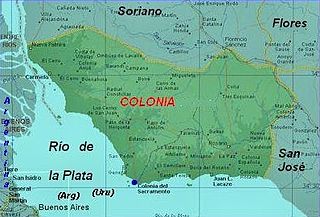
Colonia is a department of southwestern Uruguay. Its capital is Colonia del Sacramento, the country's second oldest city.

The Hyderabad Information Technology and Engineering Consultancy City, abbreviated as HITEC City, is an Indian information technology, engineering, health informatics, and bioinformatics, financial business district located in Hyderabad, Telangana, India. HITEC City is spread across 81 ha of land under suburbs of Madhapur, Gachibowli, Kondapur, Miyapur, Nanakramguda, Serilingampally, Bachupally, Manikonda, Kukatpally and Shamshabad all the combined technology townships is also known as Cyberabad with a radius of 52.48 km (32.61 mi) surrounding approximate area of 6,100 ha. HITEC City is within 2 kilometres (1.2 mi) of the residential and commercial suburb of Jubilee Hills.

Qatar Science & Technology Park (QSTP) is a home for international technology companies in Qatar, and an incubator of start-up technology businesses. Inaugurated in March 2009 as a part of Qatar Foundation, the purpose of the science park is to spur development of Qatar's knowledge economy. At an investment of more than $800 million by Qatar Foundation, the QSTP also became Qatar's first free-trade zone.
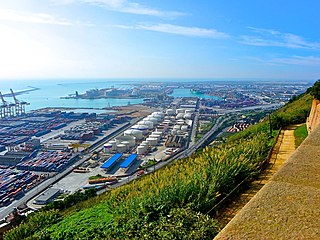
The Port of Barcelona is a major port in Barcelona, Catalonia, Spain. Its 7.86 km2 (3 sq mi) are divided into three zones: Port Vell, the commercial/industrial port, and the logistics port. The port is managed by the Port Authority of Barcelona, itself owned by the state-owned Ports of the State.
The Liepaja Special Economic Zone is the only special economic zone in the Baltics consisting of a seaport, industrial area and international airport. Liepāja special economic zone was established in 1997 to develop port operations, cargo handling, logistics, manufacturing and air transportation. The goal of the Liepāja SEZ is to attract investments for the development of the port, manufacturing, and creating new working places.

Ras Al Khaimah Free Trade Zone is a special economic zone in Ras Al Khaimah. RAK FTZ is around an hour drive from Dubai.

Pardis Technology Park (PTP) (Persian: پارک فناوری پردیس) is under the auspices of the Vice-Presidency for Science and Technology. PTP is being directed by a board of trustees which has 14 members. Head of the board is first Vice President of Iran and includes legal members from ministries, science centers, and academies.

Qasr Ahmad or Gasr Ahmed is a neighborhood and port in the eastern region of the city of Misurata in Libya. The neighborhood was developed to provide housing for port workers.

Relations between the United States and the Uruguay traditionally have been positive, based on a common outlook and emphasis on democratic ideals.
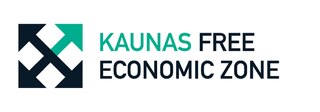
The Kaunas Free Economic Zone (FEZ) or Kaunas FEZ (Lithuanian: Kauno laisvoji ekonominė zona) is a free economic zone near Kaunas, Lithuania. It is a 534 hectare industrial development area which offers favorable and smaller taxes for production or logistics companies which invest at least 1 million euros or service companies which invest more than 100 thousand euros and employ over 20 people. The investors are mostly foreign companies, as more than 70% of total investments in Kaunas FEZ are foreign direct investments (FDI).
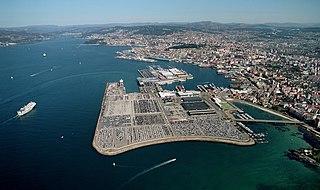
Vigo Free Trade Consortium is a public institution that has been working since 1947 to encourage international trade and economic development in southern Galicia. From its logistical area, located in the port of Vigo, the consortium oversees a free trade zone with all of its related importation and exportation advantages. As an economic development agency, the consortium is the main developer of business parks in its area of influence. It also provides companies with a whole range of services including: finance, via the capital risk company Vigo Activo; support for entrepreneurs, via business initiative centres and collaboration with the University of Vigo in the form of seed funding; plus financial information required for decision making, via the Ardan business information service.
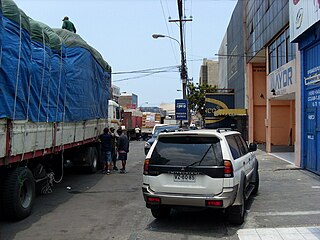
The Zona Franca de Iquique, known by the acronym Zofri, is located in the coastal port city of Iquique, in Iquique Province of the Tarapacá Region, northwestern Chile.

Trakia Economic Zone (TEZ) in Plovdiv is an industrial and commercial area and one of the biggest economic projects in Bulgaria. It includes six major industrial zones in the region of Plovdiv with a total area of 1,070 ha of which 325 ha is occupied. More than 180 Bulgarian and multinational companies operate in TEZ which employ over 30,000 people. Since 1995, TEZ has attracted over EUR 1.1 billion of fixed-capital investments. Thanks to the achievements of Trakia Economic Zone, the city of Plovdiv has ranked amongst the top three in the category "FDI strategy" in the ranking “European cities of the future 2018/2019 ” of the renowned British edition Financial Times. It is located 2 km from the City Center Plovdiv and the region occupy the third place in the ranking of the global media.

The International Business Center of Madeira (IBCM) or Madeira International Business Centre (MIBC), formally known as the Madeira Free Trade Zone, is a set of tax benefits authorised by Decree-Law 500/80 in 1980, legislated in 1986, and amended throughout the years by the Portuguese government to favor the Autonomous Region of Madeira. Its objectives are to attract foreign investment to the region and internationalise Portuguese companies by allowing them to benefit one of the lowest corporate taxation rates in Europe and in the OECD member countries.















